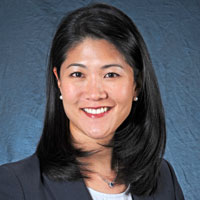Case study describes best practices in care coordination for children with disabilities
August 9, 2016
A case study published July 28 in NEJM Catalyst examines the efforts of Partners for Kids (PFK), the nation’s largest pediatric accountable care organization (ACO), in managing the needs of Medicaid-eligible children with disabilities in Ohio.
Paula H. Song, PhD, associate professor of health policy and management at the UNC Gillings School of Global Public Health, is lead author of the study.
ACOs, which are networks of hospitals and medical providers who have accepted responsibility for the costs and quality for a defined population, have potential for improving quality and reducing costs for the complex, coordinated care required by children with disabilities. However, ACOs rarely cover children with disabilities, so the work by PFK is groundbreaking.
In 2013, when Medicaid-eligible children with disabilities in Ohio were moved from fee-for-service to Medicaid managed-care plans, PFK became responsible for the care of about 8,000 children. Of those, about 47 percent were identified as high-risk and eligible for PFK’s care-coordination services.
PFK, an affiliation of Nationwide Children’s Hospital in Columbus, Ohio, and about 1,000 health-care providers, drew upon the organization’s expertise in pediatrics to coordinate care for the high-risk children.
Several criteria were established as the care-coordination program was developed. PFK first identified the children most in need of care coordination. These included children with high-risk health problems and multiple hospitalizations or emergency department visits. Then, trained care coordinators, including nurses and social workers, were hired, such that by 2015, each three-person team managed between 75 and 150 patients, visiting the patients at home and participating in clinical meetings with providers.
In addition, PFK staff worked with managed-care organizations and helped streamline records so that interventions could happen in a timely way and care could be tracked. As a result, in one cohort of 163 patients, there was a 53 percent decline in inpatient admissions and a 42 percent decrease in the number of inpatient days.
“Care coordination is very important for children with complex medical needs,” Song said, “and ACOs that are considering including children with disabilities can learn from PFK’s experience with establishing a care coordination program.”
Despite many innovations and successes in the PFK plan, Song and colleagues noted several remaining challenges, including:
- Managing large patient caseloads can be slower and more difficult for clinical staff unused to complex care coordination;
- There is a shortage of qualified nurses and social workers interested in care coordination, and training of new staff takes time and funding;
- Education about the role of care-coordination teams is essential, such that medical personnel think of the teams as valuable resources rather than a disruption to clinical care;
- Because care coordination is defined and implemented differently in different service lines, consistently tracking care coordination activities in the electronic medical record is challenging; and
- Because every patient is unique and requires different levels of care coordination – and because the program is still evolving – the impact of care coordination is difficult to measure.
Co-authors of the article are Brian Hilligoss, PhD, assistant professor of health services management and policy at The Ohio State University College of Public Health, and Sean Gleeson, MD, MBA, president of Partners for Kids and vice president for community health and wellness at Nationwide Children’s Hospital, in Columbus, Ohio.
NEJM Catalyst, a resource launched in 2015 by the NEMJ Group, which includes The New England Journal of Medicine, brings together health-care executives, clinician leaders and clinicians to share innovative ideas and practical applications for enhancing the value of health care delivery.
Share
Gillings School of Global Public Health contact: David Pesci, director of communications, (919) 962-2600 or dpesci@unc.edu

